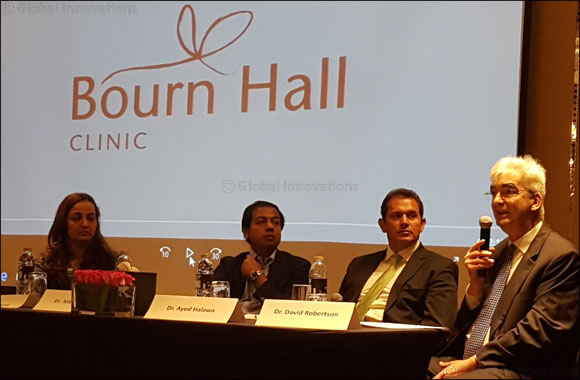
Organised by Bourn Hall Fertility Clinic, Dubai, the conference brought to fore issues related to fertility in the UAE and ways to counter them - Promising development include more accurate methods of testing, screening and eliminating abnormal chromosomes
- About 50 percent of pre-implantation embryos from IVF are chromosomally abnormal, which can increase with age
- Pregnancy loss can increase to up to 19-24 percent in recurring cases
Dubai, UAE, May 14, 2016: Improving fertility potential and maximising the success rate in IVF were the focal points of the conference organised by Bourn Hall Fertility Clinic on Friday, June 13. The event brought together fertility specialists, gynaecologists, obstetricians, urologists, embryologists, lab personnel, nurses and trainees from the region for an engaging and interactive discourse on the current trends in the field. The conference brought to fore the causes behind recurrent pregnancy failure and discussed in detail ways to better the fertility odds, particularly with respect to the cases in the UAE. Discussing the latest developments in pre-implantation genetic screening (PGS), Dr Brendan Ball, Embryology Lab Director, Bourn Hall Fertility Clinic, said: “A promising development in this field is the more accurate methods of testing, screening and eventually eliminating abnormal chromosomes, particularly to reduce miscarriages. Therefore, methods, such as aCGH – which looks at hundreds of points per chromosome – and NGS – which takes into account tens of thousands of data points per chromosomes – not only improve the chances of fertility, but likely decrease the rate of miscarriage resulting from the presence of abnormal chromosomes. Studies have also shown that there are overall about 50 percent of human pre-implantation embryos from IVF are chromosomally abnormal, which can increase with age”. Earlier, Dr David Robertson, Group Medical Director and IVF Consultant, Bourn Hall Fertility Clinic, identified the possible causes of early pregnancy loss, pointing out that recurrence increases if there is a history attached. “Women who’ve had successful pregnancies have about 4 to 6 percent chance of loss, whereas the chances can increase up to 19-24 percent in case of prior pregnancy loss,” he explained, adding “Even in healthy women, the likelihood of pregnancy loss is as high as 34 percent. Moreover, a single miscarriage, unless a successful pregnancy intervenes, increases the risk for the next pregnancy.” Delving further into the causes of recurrent pregnancy loss, Dr David further explained that 10 – 15 percent of recurrent first trimester losses have congenital anomaly. “One of the most common factors is the variations of the double uterus – an abnormal condition where the uterus is not created as one hollow organ to cradle the foetus, but separates into two tubes leading to pregnancy failure,” he added. While stressing on the importance of pre-implantation genetic screening and diagnosis, Dr Rupali Chopra, Lab Director, PFD, Igenomix, Dubai, identified the indications that necessitate the screening. These included advanced maternal age (more than 38 years), more than two IVF failures, more than two miscarriages, prior pregnancy or child which was chromosomally abnormal and low sperm count. She added that by assessing embryo viability, people stand a good chance of improved implantation, decreased miscarriage rates and a lesser risk of abnormal birth. Another important topic of discussion was myomectomy, or the removal of fibroids which tend to grow rapidly during fertility.Uterine fibroids are also one of the most common benign smooth muscle tumours in women, prevailing in 20 to 40 percent in women over the age of 35 years. Dr Nikita Trehan, Obgyn and Laparascopic Surgeon, Sunrise Hospital, India and International Modern Hospital, Dubai, took the audience through the virtues of laparoscopic –or non-invasive – myomectomy.She also drew comparison between the different treatments to remove fibroids. In a separate presentation, Dr Nikita spoke about managing adenomyosis, a condition that causes menstrual cramps, lower abdominal pressure, and bloating before menstrual periods and can result in heavy periods. The conference also discussed the role of hysteroscopy in a presentation by Dr Rajesh Devasi, Obgyn and Laparascopic Surgeon at Dubai London Hospital, and the use of endoscopy in improving fertility potential by Dr Ayed Halawa, Obgyn and Laparascopic Surgeon at N9ne Medical Institute, Dubai. The conference was largely punctuated by Q and A sessions and active panel discussions hosted by the speakers and Dr Diana Kayal, Obs-Gynand IVF Specialist at Bourn Hall Clinic. Earlier, Dr David Robertson welcomed the guests and speakers, while Sudhir Bahl, Managing Director, Bourn Hall Fertility Clinic, Dubai, made the opening remarks.
|

